The Committee

There is no greater cinematic seduction than that of black and white film. Something about the absence of color helps you tune into so many other things and lose yourself in the screen; the images seem so much more complete and the messages come through clearly. While this film is fairly short, I feel even more excited about the filmmaker's ability to eliminate fluff and find that the choice to make your point quickly will never go out of fashion. In fact, the movie reminded me of a sci-fi picture without the excess and flash. The most charming part about The Committee is that it is a confident work that flaunts only that sense of assured storytelling.
The movie is from the '60s and known mainly for its groovy/intellectual soundtrack by Pink Floyd, and for the fact that it attacks conformism and politics within societies. It opens with a quote on free will and Britain's collective position on both revolt and passive submission. It then moves on to a young man (Paul Jones) hitchhiking across woodlands who is picked up by a talkative egoist (Tom Kempinski). When the men stop to check on the car, the young man beheads the driver, then puts his head back on and leaves the scene. He returns to the city and his dull job as an architect and receives a summons to attend a committee. Rumor has spread that committees are complex gatherings in the country. As little as eight and as many as300 people are gathered and separated into groups in order to be surveyed, tested, and probed. The idea behind it is to see how the majority of people approach issues as meaningless as fruit, to a game of chess. One might be isolated in the country for a week up to a month, and in the end, the data gathered will help those in power control and regulate society. You could then compare such a letter to the draft, only the war you wage is entirely in your head. For our protagonist, he is fighting the urge not to go along with the government's game by attending.
Continue ReadingIn The Heat Of The Night
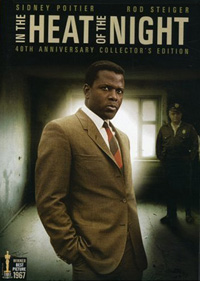 The racial politics of In The Heat Of The Night may not be as shocking or edgy today as they were back in the bad old days of 1967. Matter of fact, it may even be a little corny and perhaps the drama can feel obvious, but as a piece of detective pulp it’s solid, and as a showcase for the great Rod Steiger at his scenery-chewing best it’s more than watchable. This was a period full of Southern dramas with some then socially hot elements - Hurry Sundown, ...tick…tick… tick…, The Liberation Of L.B. Jones, The Klansman, even The Chase. While those films are all utterly dated (they would seem a little more brave if they had been produced ten year earlier), In The Heat Of The Night holds up fairly well, because it’s a mystery film first, with a lot of style, and an all-star team behind the camera. It’s also the best of Sidney Poitier’s groundbreaking run of films in the '60s that made him the first black box office superstar.
The racial politics of In The Heat Of The Night may not be as shocking or edgy today as they were back in the bad old days of 1967. Matter of fact, it may even be a little corny and perhaps the drama can feel obvious, but as a piece of detective pulp it’s solid, and as a showcase for the great Rod Steiger at his scenery-chewing best it’s more than watchable. This was a period full of Southern dramas with some then socially hot elements - Hurry Sundown, ...tick…tick… tick…, The Liberation Of L.B. Jones, The Klansman, even The Chase. While those films are all utterly dated (they would seem a little more brave if they had been produced ten year earlier), In The Heat Of The Night holds up fairly well, because it’s a mystery film first, with a lot of style, and an all-star team behind the camera. It’s also the best of Sidney Poitier’s groundbreaking run of films in the '60s that made him the first black box office superstar.
In Sparta, Mississippi patrolman Sam Wood (the great character actor Warren Oates) makes his nightly rounds, after peeping at a topless woman he makes a startling discovery – the murdered body of wealthy Industrialist, Philip Colbert. Newly installed police chief Bill Gillespie (Steiger) sends him to check out the pool hall and bus station for any drifters, and wouldn’t you know it, Wood finds a well-dressed black man with a wallet full of bills waiting for a bus. The cops think they have an open and shut case, until they find out the black man, with a clear alibi, is actually Virgil Tibbs (Poitier), a Philadelphia homicide detective just passing through. The fact that he makes more money than them, is obviously smarter and is black throws these backwoods hicks for a loop. Tibbs wants to leave town but after clearing another wrongly accused guy, he impresses the deceased man’s wife, Leslie Colbert (Lee Grant), and she puts pressure on Gillespie to keep Tibbs on the case. And of course, Tibbs’ super-sleuthing leads to budding respect from the otherwise racist cops.
Lords of Dogtown

I'm slightly envious of Stacy Peralta for not only conquering the professional skateboarding world but also for his career as a filmmaker. These two industries, in the general sense, do not correlate, but he manages to find the bridge. The result? A fantastic documentary about the legendary Z-Boys skate team in 1970s Venice named Dogtown Z-Boys, a 2004 documentary chronicling the evolution of big wave surfing called Riding Giants, and a biographical feature film about the Z-Boys journey titled Lords of Dogtown. Peralta penned the screenplay himself, with Catherine Hardwicke (Thirteen and Twilight) directing.
The film, while written with obvious yet needed nostalgia, is action-packed full of skateboarding glamour, parties, competitions, strained friendships, and the intensity of male adolescent energy. The plot is loose and without any specific thread other than to chronicle the history of what happens to the Zephyr Skate Team from the beginning of their surfing days to the point where they meet again after the start of their separate careers. The lack of any overbearing plot creates an enjoyable, fast-paced energy that captures a certain spirit of the pioneering skate culture from the 70s.
Continue ReadingThe Queen
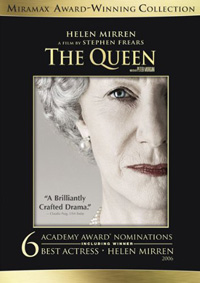 Playwright and screenwriter Peter Morgan has become one of the top chroniclers of odd-couple conflicts just below the surface of history's reach during the last couple decades. The Last King of Scotland was about the relationship between Ugandan dictator Idi Amin and his young Scottish doctor. Frost/Nixon chronicled the details of the famous filmed conversations between the broadcaster and the disgraced ex-president. Morgan's television movie, The Deal, directed by Stephen Frears, contrasted the difference between two British politicians, Gordon Brown and Tony Blair. As a follow-up, Morgan, Frears, and actor Michael Sheen, who perfectly captures Blair in looks and spirit, re-teamed with The Queen. This time Blair is a supporting character on screen, though still a vital half of another mismatched odd couple with Queen Elizabeth II, played brilliantly by Helen Mirren. The Queen details how Blair just might have saved the royal family from total irrelevancy after their reluctance to acknowledge Princess Diana after her death.
Playwright and screenwriter Peter Morgan has become one of the top chroniclers of odd-couple conflicts just below the surface of history's reach during the last couple decades. The Last King of Scotland was about the relationship between Ugandan dictator Idi Amin and his young Scottish doctor. Frost/Nixon chronicled the details of the famous filmed conversations between the broadcaster and the disgraced ex-president. Morgan's television movie, The Deal, directed by Stephen Frears, contrasted the difference between two British politicians, Gordon Brown and Tony Blair. As a follow-up, Morgan, Frears, and actor Michael Sheen, who perfectly captures Blair in looks and spirit, re-teamed with The Queen. This time Blair is a supporting character on screen, though still a vital half of another mismatched odd couple with Queen Elizabeth II, played brilliantly by Helen Mirren. The Queen details how Blair just might have saved the royal family from total irrelevancy after their reluctance to acknowledge Princess Diana after her death.
After the humiliating divorce between Prince Charles and Princess Diana, England’s monarchy might need to ask itself some hard questions, but Queen Elizabeth won't have it. When the touchy-feely Tony Blair, England’s answer to Bill Clinton, was elected Prime Minister in 1997 with promises to modernize the country, it sent shivers up the spines of the royal family. A few months after getting elected and an awkward first meeting with the Queen, they are both at the center of a storm when Diana and her playboy boyfriend, Dodi Fayed, are tragically killed in a Paris car accident. The royal family have no idea how to react. The Queen resorts to her WWII “stiff upper lip” posture: say nothing, show no emotion, and just stay out of the public eye. Tradition! Diana was no longer part of the royal family, so it was not her concern. But Blair understood the modern sensibility of public mourning and after dubbing her “the People’s Princess” his numbers skyrocket while the Queen’s coldness sinks her.
Last Tango In Paris

Film acting can be defined with "before Brando" and "after Brando." Marlon Brando brought a reality and a vulnerability to the screen that had never been fully been realized by a major movie star before his startling run of influential film performances in the early 1950s. The generations of "method actors" (Dean, Newman, Hoffman, De Niro, Pacino, Penn, etc.) all cited Brando as their number-one influence on their own revolutionary work.
No other actor has given a string of film performances like the first half dozen of Brando's performances; they were monumental. The Men (1950), A Streetcar Named Desire (1951), Viva Zapata! (1952), Julius Caesar (1953), The Wild One (1953), and On the Waterfront (1954) (for which he finally won his first Oscar) all contributed to his legend.
Continue ReadingTaxi Driver
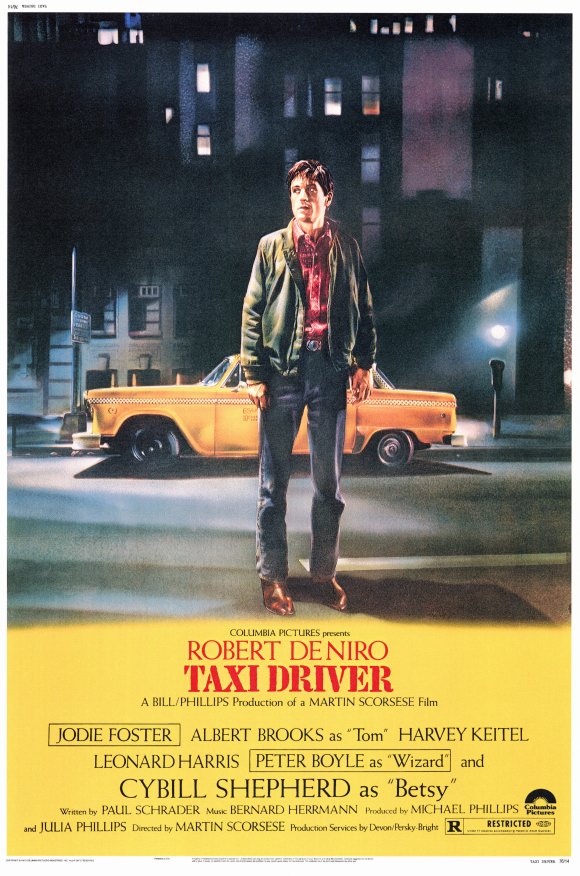 The culty acclaim of Martin Scorsese’s 1976 Taxi Driver is mostly deserved; the film is made up of some of the greatest scenes and moments of the decade. But with that there are some scenes and moments that don’t work as well. Really what Taxi Driver is is a good ol’ fashioned 70s exploitation flick, gussied up with a big-time director and cast. It’s a perfect combination of two of the era’s most potent B-movie formulas, “the crazy Vietnam vet” flick and “the New York city loner vigilante” saga. Two genres of exploitation pulp that go together like peanut butter and chocolate, after a while you can’t imagine one without the other. Like Scarlet O’Hara or Forest Gump, the name Travis Bickle has become a cultural definition of a type. Robert De Niro, at the peak of his thespian prowess, plays the lonely city taxi driver who prowls the street in search of some kind of meaning for his life. Teaming with Scorsese for the second time (after the brilliant Mean Streets, and with six more collaborations to come), it’s one of the great actor’s most iconic roles, and still a signature film for the director.
The culty acclaim of Martin Scorsese’s 1976 Taxi Driver is mostly deserved; the film is made up of some of the greatest scenes and moments of the decade. But with that there are some scenes and moments that don’t work as well. Really what Taxi Driver is is a good ol’ fashioned 70s exploitation flick, gussied up with a big-time director and cast. It’s a perfect combination of two of the era’s most potent B-movie formulas, “the crazy Vietnam vet” flick and “the New York city loner vigilante” saga. Two genres of exploitation pulp that go together like peanut butter and chocolate, after a while you can’t imagine one without the other. Like Scarlet O’Hara or Forest Gump, the name Travis Bickle has become a cultural definition of a type. Robert De Niro, at the peak of his thespian prowess, plays the lonely city taxi driver who prowls the street in search of some kind of meaning for his life. Teaming with Scorsese for the second time (after the brilliant Mean Streets, and with six more collaborations to come), it’s one of the great actor’s most iconic roles, and still a signature film for the director.
As a guy who doesn’t need sleep and doesn’t mind venturing in to the rougher sides of town, Travis is instantly hired as a cabbie. He learned some of the ropes from colleagues over late night coffee stops, led by Wizard (go-to working class character actor Peter Boyle). His clientele ranges from the high end to creeps (Scorsese in a fantastic scene), and pimps and hookers—that’s where he meets and becomes kinda obsessed with Iris (Jodie Foster), a teenage hooker who was briefly fleeing her pimp, Sport (Harvey Keitel). He also strikes up a near romance with a beautiful campaign worker, Betsy (Cybill Sheperd), who works for senator Palantine (Leonard Harris). Though her coworker (Albert Brooks) has his doubts about Travis, she agrees to go out with him. He blows it when he idiotically takes her to see a porn movie. Getting blown off by her gives him more time to fret over Iris; his obsession with her does not seem to be sexual, he just has a high moral code and feels like he can help her. And he sinks deeper into a type of self-obsessed heroic fantasy. After killing a guy who attempts to rob a grocery store his itch for more action grows so he gives himself a Mohawk hairdo and makes a feeble attempt at shooting Palantine. Instead, when that doesn’t work out he goes after Iris’s pimp, culminating in an extremely bloody shoot-out with him and the whorehouse manager in front of Iris, where he kills both of them and gets shot up himself.
Before The Devil Knows You're Dead

Maybe it sounds odd to call a movie "great" if by the end it makes you feel like your soul was taken away, but Before The Devil Knows You're Dead is such a work. With an amazing ensemble cast and a non-linear script that reveals new facts about the characters all the way until the final shot--this is a film that reminds you how powerful dramatic fiction is supposed to work.
Through the different character's perspectives, the film is about the build-up and aftermath of a botched jewelry store robbery in the suburbs. Opening with the violent event, we soon find out afterwards that brothers Andy (Philip Seymour Hoffman) and Hank (Ethan Hawke) planned the robbery together as a victimless crime in response to some urgent needs for money. But these aren't your typical, slick movie heist-men whatsoever. Andy is a somewhat well-off business accountant seeking escape for a more fulfilling life, while Hank is a single father who's desperately behind on child support. Part of what makes the film work so well is how the script gradually unfolds and clues the audience into new details as it plays, so the only other plot point worth mentioning here is that the store they rip off happens to be owned by the men's parents, Charles (Albert Finney) and Martha (Amy Ryan).
Continue ReadingTuff Turf
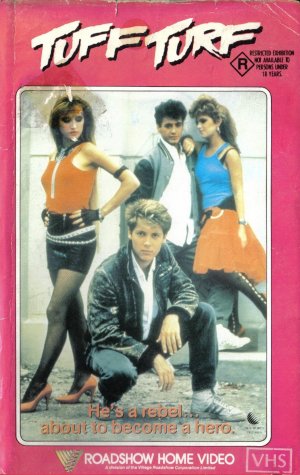 Like a stunned archaeologist I happened upon a relic from the past that may be a Holy Grail for shining light on an era and a people; it’s a little movie called Tuff Turf. Perhaps it can be used not to tell us about life in 1985 — I imagine that any relation to actual life is purely coincidental — no, it tells us more about the hack filmmakers of that period. Like so many films about young people in that period, the filmmakers are highly influenced by the worst qualities of music videos and seem intent on filling the movie with banal musical interludes. It’s a mix of Class of 1984 and Footloose (which obviously includes some Rebel without a Cause), mixing in live performances but without the skill of Streets of Fire. Yes, it’s supposed to be a gritty school gang vs. the new guy flick, but where flicks like Class of 1984 and even Bad Boys were legitimately disturbing, even with some heavy moments of violence Tuff Turf carries the influential stamp of Grease 2, or worse, ‘60s beach movies. There’s actually a shocking moment when the kids break out in a spontaneous, highly choreographed dance number (no, really); any state of edge in the film is an accident. Oh, and the editing and timing are completely stilted and awkward. However, these minor grievances aside, Tuff Turf is a bad film; as a matter of fact its severe mediocrity actually makes it all the more fascinating and entertaining.
Like a stunned archaeologist I happened upon a relic from the past that may be a Holy Grail for shining light on an era and a people; it’s a little movie called Tuff Turf. Perhaps it can be used not to tell us about life in 1985 — I imagine that any relation to actual life is purely coincidental — no, it tells us more about the hack filmmakers of that period. Like so many films about young people in that period, the filmmakers are highly influenced by the worst qualities of music videos and seem intent on filling the movie with banal musical interludes. It’s a mix of Class of 1984 and Footloose (which obviously includes some Rebel without a Cause), mixing in live performances but without the skill of Streets of Fire. Yes, it’s supposed to be a gritty school gang vs. the new guy flick, but where flicks like Class of 1984 and even Bad Boys were legitimately disturbing, even with some heavy moments of violence Tuff Turf carries the influential stamp of Grease 2, or worse, ‘60s beach movies. There’s actually a shocking moment when the kids break out in a spontaneous, highly choreographed dance number (no, really); any state of edge in the film is an accident. Oh, and the editing and timing are completely stilted and awkward. However, these minor grievances aside, Tuff Turf is a bad film; as a matter of fact its severe mediocrity actually makes it all the more fascinating and entertaining.
Understanding what motivates the lead character Morgan Hiller is a challenge for viewers because he’s played by a young James Spader, who even in his best performance (Sex, Lies, and Videotape) can come off as aloof and odd, as if he’s Christopher Walken’s prettier younger brother. After a long music video credit sequence, the film opens with a group of Los Angeles Valley teen toughs straight out of Michael Jackson’s “Beat It” video, mugging a civilian. The hair-sprayed bandanna gang is led by big-chested Nick (thirty-something looking Paul Mones) and his devoted main squeeze, Frankie (child star later turned reality TV mess, Kim Richards). Morgan rides his bike, whistling past the gang spray painting their faces and ruining their crime. Is he some kind of teen vigilante? Nope, just an East Coast rich kid who relocated to L.A. after his family fortune went bust. Now this former prep school rebel has to figure out how to fit in at a rough public school; it didn’t help to make enemies with Nick and his crew. Even after they publicly mess up his bicycle the nearly fearless Morgan continues to woo the much more “street” Frankie, pushing Nick’s wrath even further.
Bloody Sunday
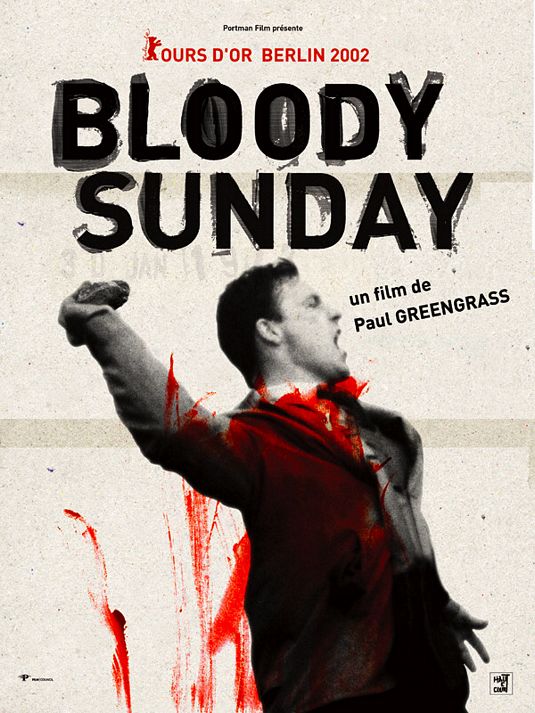 One of the best examples of docu-realism in the Battle of Algiers-mode, Bloody Sunday, from director and writer Paul Greengrass, was originally made for Granada Television (a high quality UK outfit) but after an acclaimed screening at the Sundance Film Festival it got its theatrical run and instantly made Greeengrass a director in high demand. He went on to direct the final two Bourne flicks as well as another outstanding docu-drama, United 93. Bloody Sunday tensely recreates the events of the 1972 peace march in the Bogside of Derry, Northern Ireland that spiraled out of control as itchy trigger fingered British paratroopers opened fire on marchers killing 14 and then covering their own actions. The film tries to show the points of view of both sides, but no matter how even-handed the film intended to be, and even with the usual IRA types running around looking for a fight, it’s impossible to see it as anything less than a British massacre of the innocent.
One of the best examples of docu-realism in the Battle of Algiers-mode, Bloody Sunday, from director and writer Paul Greengrass, was originally made for Granada Television (a high quality UK outfit) but after an acclaimed screening at the Sundance Film Festival it got its theatrical run and instantly made Greeengrass a director in high demand. He went on to direct the final two Bourne flicks as well as another outstanding docu-drama, United 93. Bloody Sunday tensely recreates the events of the 1972 peace march in the Bogside of Derry, Northern Ireland that spiraled out of control as itchy trigger fingered British paratroopers opened fire on marchers killing 14 and then covering their own actions. The film tries to show the points of view of both sides, but no matter how even-handed the film intended to be, and even with the usual IRA types running around looking for a fight, it’s impossible to see it as anything less than a British massacre of the innocent.
Inspired by the American civil rights movement, the Catholics of Northern Ireland lived in a near police state under British control; the marchers even used “We Shall Overcome” as their theme song. The march was led by their local MP, Ivan Cooper, ironically a Protestant himself leading a peaceful Catholic rebellion. As played brilliantly by James Nesbitt, Cooper is the epitome of good intentions in a bad situation; he often references his idol Martin Luther King and does everything he can do to keep his marchers peaceful, but unfortunately for him this is Northern Ireland not Selma. The Northern Ireland-born Nesbitt, a staple on UK TV, was mostly known for lightweight fare like the show Cold Feet; here he gives the performance of his career. It’s a stunning piece of acting; Cooper is desperate to lead, but the weight of events is just too overpowering for him and Nesbitt earns the viewer’s respect while our hearts go out to him.
Midnight Cowboy
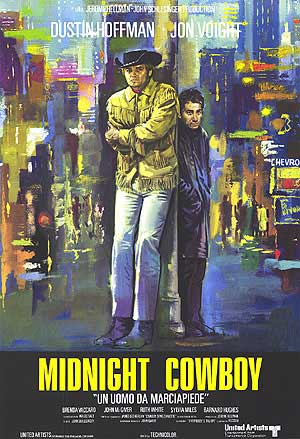 Though “X-rated” means something different than it did in 1969, it’s still a badge of honor that Midnight Cowboy is the only film with that “for adults only” label to have won the Best Picture Oscar (Last Tango in Paris being the other great “X-rated” flick of the era). Midnight Cowboy is less shocking today; sexually, it’s not the graphic images that provide the punch it’s the intellectually complicated nature of the characters’ sexuality that still can move an audience. As a follow up to The Graduate, Dustin Hoffman proved he was more than a one-hit wonder and instead that he had a long and vital career ahead of him. It also deservedly made a star out of a little known pretty-boy actor named Jon Voight. And it also put British director John Schlesinger on the American A-list, a guy whose deep sensitivity and open homosexuality put him ahead of his time. The film’s theme song, “Everybody’s Talkin’” performed by Harry Nilsson, has become the iconic standard bearer for images of a lonely guy walking the streets of New York. Midnight Cowboy also is a fascinating peek at an era both for representation for how an artist works at a time when the movie studios were willing to take a chance on a grubby flick about a would-be male prostitute and his new BFF while also revealing a dark side to the Big Apple during what has sometimes been considered a golden age of self-expression.
Though “X-rated” means something different than it did in 1969, it’s still a badge of honor that Midnight Cowboy is the only film with that “for adults only” label to have won the Best Picture Oscar (Last Tango in Paris being the other great “X-rated” flick of the era). Midnight Cowboy is less shocking today; sexually, it’s not the graphic images that provide the punch it’s the intellectually complicated nature of the characters’ sexuality that still can move an audience. As a follow up to The Graduate, Dustin Hoffman proved he was more than a one-hit wonder and instead that he had a long and vital career ahead of him. It also deservedly made a star out of a little known pretty-boy actor named Jon Voight. And it also put British director John Schlesinger on the American A-list, a guy whose deep sensitivity and open homosexuality put him ahead of his time. The film’s theme song, “Everybody’s Talkin’” performed by Harry Nilsson, has become the iconic standard bearer for images of a lonely guy walking the streets of New York. Midnight Cowboy also is a fascinating peek at an era both for representation for how an artist works at a time when the movie studios were willing to take a chance on a grubby flick about a would-be male prostitute and his new BFF while also revealing a dark side to the Big Apple during what has sometimes been considered a golden age of self-expression.
Apparently screenwriter Waldo Salt (who was just emerging from two decades of being blacklisted) took a lot of liberties with James Leo Herlihy’s underground but acclaimed novel. A Texas dishwasher named Joe Buck (Voight) decides to drop his apron and take advantage of his good looks; he busses up to Manhattan under the illusion that it’s a city full of rich women and fairies. They need a real cowboy to show them what a true man is. Unfortunately life in the big city doesn’t turn out like he hoped. There’s competition in the cowboy hustler department and most people are not charmed by his act. He does finally hook up with a seemingly wealthy older woman but when he requests payment for his services, she turns the tables and he ends up paying her. Similar trysts with two men, a religious nut and a teenage boy (a young Bob Balaban), prove fruitless as Joe is kicked out of his pad and finds himself cold, hungry, and homeless.





